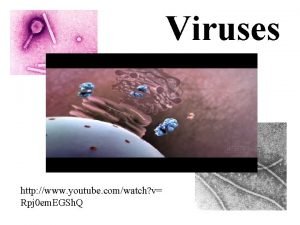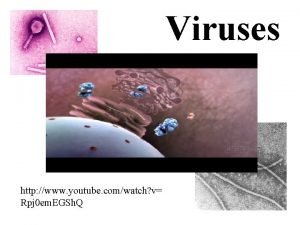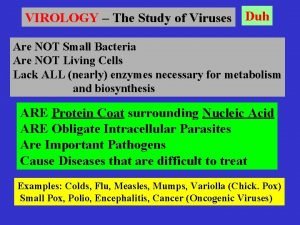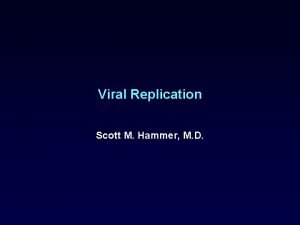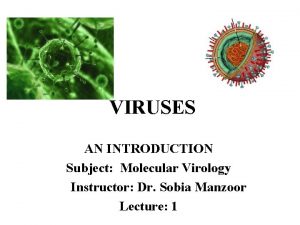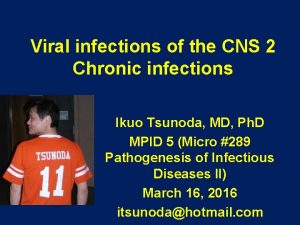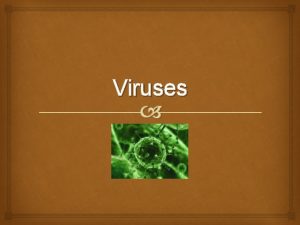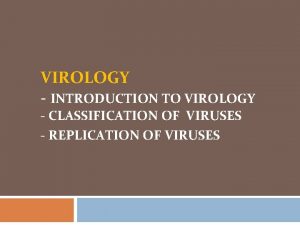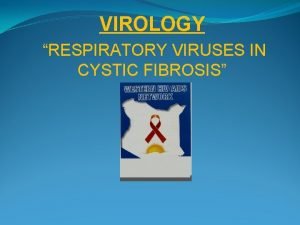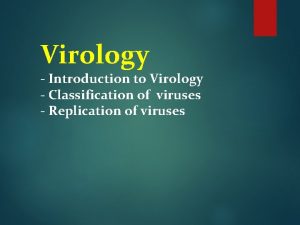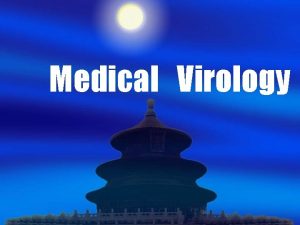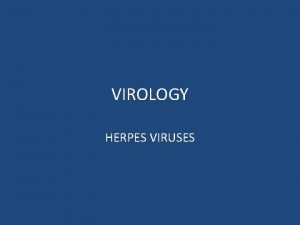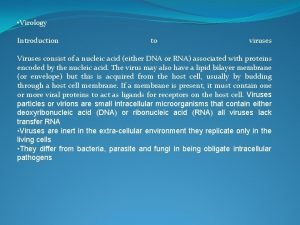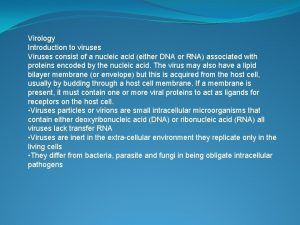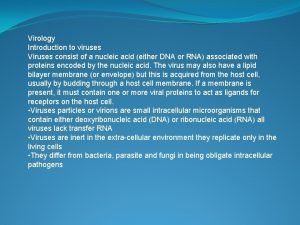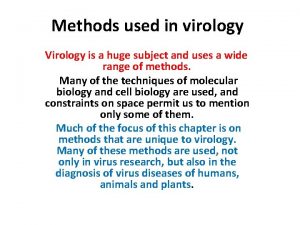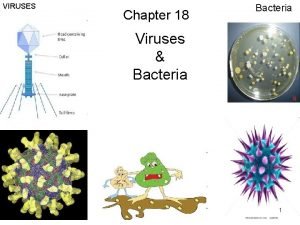Viruses Virology is the study of viruses Viruses














- Slides: 14

Viruses § Virology is the study of viruses § Viruses are “biological entities” containing either DNA or RNA that require another cell to survive. § Viruses have some, but not all, of the characteristics of life. *So are viruses living or non-living? * § Viruses seem to exist only to make more viruses! Biology Science Department Deerfield High School

Biology Science Department Deerfield High School

Viral Structure § All viruses have the same basic structure: Capsid (Protein coat) Biology Science Department Deerfield High School Nucleic acid core (DNA or RNA)

Biology Science Department Deerfield High School

Viral Life Cycle There are 2 main life cycles for a virus: 1. The lytic cycle- viral replication cycle in which a virus takes over a host cell's genetic material and uses the host cell's structures and energy to replicate until the host cell bursts, killing it. • This cycle kills the host cell almost right away. Biology Science Department Deerfield High School

Viral Life Cycle 2. The lysogenic cycle--- a viral replication cycle in which the virus's nucleic acid is integrated into the host cell's chromosome, a provirus is formed and replicated each time the host cell reproduces. The virus remains inactive, sometimes for years, waiting for the right conditions to activate and then start the lytic cycle. Biology Science Department Deerfield High School

How Do Viruses Work? § In order to replicate and make copies of itself, viruses need a host cell. Any living cell can become a host cell (human, animal, plant, and even bacterial cells!) § Without a host cell, viruses cannot function (i. e. are harmless!) § Although any cell can theoretically become a host cell, specific viruses will only infect specific cells (EX: HIV will only infect human T cells, a part of your immune system) Biology Science Department Deerfield High School

How does a virus take over a host cell? § ①Attach: The capsid of the virus binds to receptor proteins on the surface of a host cell, tricking the host cell into thinking it’s not a foreign invader. § ②Penetration/Injection: The virus then injects its genetic material (DNA or RNA) into the host cell and becomes part of the cell. – At this point the cell can enter the lytic or lysogenic cycle. Biology Science Department Deerfield High School

How Do Viruses Work? § ③Biosynthesis: The viral genes are expressed, turning the host cell into a virusmaking factory producing capsids, copies of the DNA or RNA, surface receptors, etc. § ④Release: The host cell eventually bursts, releasing the hundreds of newly formed viruses to infect surrounding cells! VIDEO CLIP: How Viruses Work Biology Science Department Deerfield High School

Viruses § Viruses can cause disease in humans, animals, plants, and even bacteria! § Viruses can cause a variety of diseases: – Common cold – Polio – Hepatitis A, B & C – Influenza – Herpes – Mumps – Mononucleosis – Measles – Warts – Viral Meningitis – Chickenpox – AIDS Biology Science Department Deerfield High School

Protection § There a few big ways to protect yourself against pathogens (disease causing agents) – Antibiotics (drugs to kill bacteria) – Antivirals (drugs to treat viruses) – Vaccination (using your body’s own immune system to preemptively guard against attack) Biology Science Department Deerfield High School

§ § Antivirals can only be used to treat certain viral infections! Does not “kill” or disarm the virus permanently; only shortens symptoms by 1 -2 days. Usually only prescribed to patients with life threatening symptoms or those that have a greater chance of developing complications (because of their age or they have a high-risk medical condition). Just like antibiotics, there is evidence of antiviral resistance too! Biology Science Department Deerfield High School

Vaccination § Vaccines can only be used to prevent infections (both viral and bacterial) from leading to disease. § “Trick” your immune system to make antibodies that destroy foreign “bodies” or particles (such as bacteria and viruses). Your body remembers how to make these antibodies when the real thing invades. § Made from a weakened virus, inactivated virus, or by using only part of the virus/bacteria itself. Biology Science Department Deerfield High School

Biology Science Department Deerfield High School
 Unlike lytic viruses, lysogenic viruses do not
Unlike lytic viruses, lysogenic viruses do not Watch?v=dhlvcdeg0yg
Watch?v=dhlvcdeg0yg Virology
Virology Estrutura do virus
Estrutura do virus Fields virology
Fields virology Introduction to medical virology
Introduction to medical virology Fields virology
Fields virology Tỉ lệ cơ thể trẻ em
Tỉ lệ cơ thể trẻ em Vẽ hình chiếu vuông góc của vật thể sau
Vẽ hình chiếu vuông góc của vật thể sau đặc điểm cơ thể của người tối cổ
đặc điểm cơ thể của người tối cổ Các châu lục và đại dương trên thế giới
Các châu lục và đại dương trên thế giới Thế nào là hệ số cao nhất
Thế nào là hệ số cao nhất Sơ đồ cơ thể người
Sơ đồ cơ thể người ưu thế lai là gì
ưu thế lai là gì Môn thể thao bắt đầu bằng từ chạy
Môn thể thao bắt đầu bằng từ chạy
